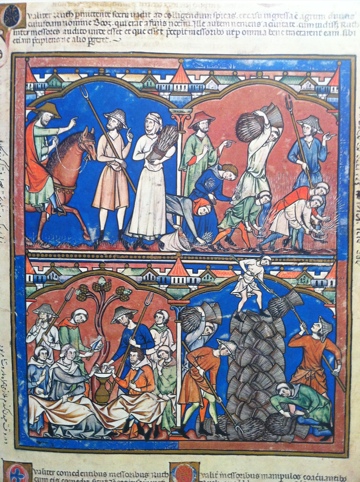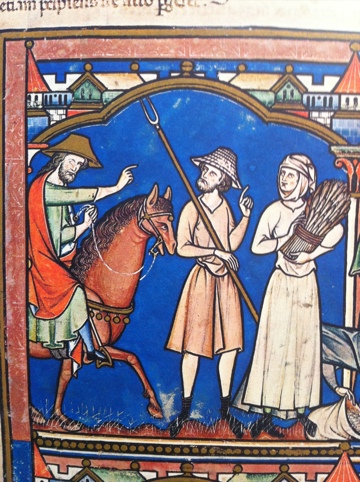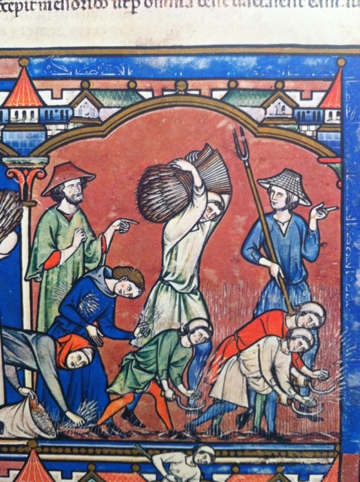More than once I have written about the origin and meaning of Dominus vobiscum and the response Et cum spiritu tuo and the new, corrected translation. In my explanations I have written about a Biblical locus for consideration of what Dominus vobiscum means. Here is part of what I found:
Dominus vobiscum is rooted in the Judeo-Christian tradition. The great liturgical scholar Joseph Jungmann points out that “both the greeting and the reply are ancient, their origins hid in pre-Christian times.” In Ruth 2:4 Booz (or Boaz) greets the reapers with “Dominus vobiscum”. The salutation was a part of everyday life and we find it several times in Holy Scripture (Jungmann lists: 2 Timothy 4:22, Philemon 25, Galatians 6:18, Philippians 4:23). The reapers of Booz reply (in the Latin Vulgate of course) “Benedicat tibi Dominus… May the Lord bless you.” Jungmann offers that “we employ in its place a phrase which means almost the same thing: Et cum spiritu tuo, a formula which betrays its Hebrew origin and has many parallels in St. Paul”. Jungmann adds in a footnote (p. 363, n 16): “This is a Semitism: Spiritus tuus = your person = you.”
Jungmann points to the near equivalence of the Latin response of the reapers (in the Vulgate) and the Latin response “Et cum spiritu tuo”. Today many people who object to the more literal translation now in preparation point to this very argument. They make the claim, probably founded on this very page of Jungmann’s book, that “And also with you” really is an accurate translation of “Et cum spiritu tuo”, and that therefore we should stick to “And also with you”, since “And with your spirit” will sound strange to people.
Of course we are not Biblical positivists. Our Christian tradition have lent greater depth to the greeting. The liturgical texts also constitute their own theological source, and therefore they are to be translated as they are, especially in light of our tradition, which is, the spiritus refers to the character imparted by Holy Orders.
But they point I was driving at is this.
Some time ago, a kind reader sent me from his own collection of books, a large volume of beautiful medieval manuscript illustrations of Biblical texts. Among them I found Booz and the Reapers.
In the upper left panel/episode, look!, here comes Booz! Entrance stage right. He has a groovy hat. His hand is raised in greeting. He is saying “Dominus vobiscum“! The foreman of the reapers replies.

In the second panel, on the upper right, Booz has lost his cloak and is now on foot, though he has retained his groovy hat. Here is a detail of the first panel. Note the stubble, indicated by little white lines at the bottom along the ground. Booz has a highstepping, courtly and very attentive horse.
Ruth is below, gathering stubble and stuffing it into a bag.
In any event, I thought I would share something of my delightful find in this manuscript illustration.
Booz and the Reapers are also with you!




































As an Episcopalian, before seeing it was not truly Catholic, I and everyone always said “And with thy spirit” until the Catholics began saying “And also with you”. I was amazed, and even tho very young at the time, wondered why they would change such a lovely exchange to such a clunky one. I am glad I may, God willing, to be able to say “And with your spirit” as a Catholic. A “thy” may escape now and then.
One might add that the proof of the layer of understanding of the greeter’s ordained soul added in Catholic tradition is that this greeting is now reserved (liturgically) to those in holy Orders. A layman leading an Office does not use it, but says “Domine exaudi…”
Thus we should think carefully before wishing to deny to our priests the strength of this repeated daily prayer for the strength of their marked souls.
Don’t bishops say something different? Or am I nuts?
Modern man thinks he’s so cool. Even among the faithful, outside of “safe” milieus, one almost never hears an exchange that mentions God and his blessings, wished upon brother by brother. We are pathetic. satan doesn’t have to try very hard in the modern world. Why would he, when souls are so afraid, incredulous, confused, to even mention their creator to one another and wish each other well in His name, via Him. We don’t have lead pipes anymore, but the ancients had real soul. In that department they have us whipped.